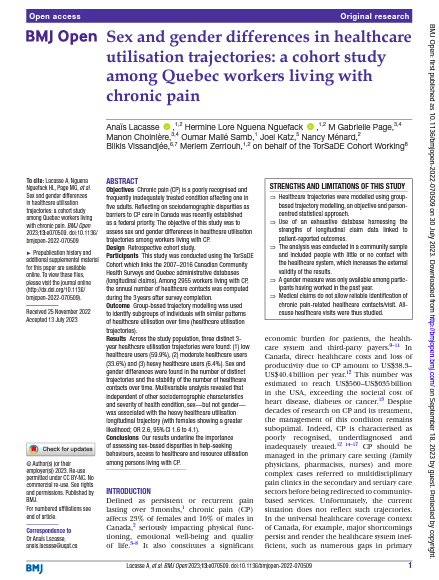Sex and gender differences in healthcare utilisation trajectories: a cohort study among Quebec workers living with chronic pain
Abstract
Objectives Chronic pain (CP) is a poorly recognised and frequently inadequately treated condition affecting one in five adults. Reflecting on sociodemographic disparities as barriers to CP care in Canada was recently established as a federal priority. The objective of this study was to assess sex and gender differences in healthcare utilisation trajectories among workers living with CP.
Design Retrospective cohort study.
Participants This study was conducted using the TorSaDE Cohort which links the 2007–2016 Canadian Community Health Surveys and Quebec administrative databases (longitudinal claims). Among 2955 workers living with CP, the annual number of healthcare contacts was computed during the 3 years after survey completion.
Outcome Group-based trajectory modelling was used to identify subgroups of individuals with similar patterns of healthcare utilisation over time (healthcare utilisation trajectories).
Results Across the study population, three distinct 3-year healthcare utilisation trajectories were found: (1) low healthcare users (59.9%), (2) moderate healthcare users (33.6%) and (3) heavy healthcare users (6.4%). Sex and gender differences were found in the number of distinct trajectories and the stability of the number of healthcare contacts over time. Multivariable analysis revealed that independent of other sociodemographic characteristics and severity of health condition, sex—but not gender—was associated with the heavy healthcare utilisation longitudinal trajectory (with females showing a greater likelihood; OR 2.6, 95% CI 1.6 to 4.1).
Conclusions Our results underline the importance of assessing sex-based disparities in help-seeking behaviours, access to healthcare and resource utilisation among persons living with CP.
Members and SHERPA Teams

Bilkis Vissandjée
Professor, Faculté des sciences infirmières, Université de Montréal

